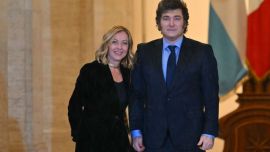Argentina’s monthly inflation rate dropped to a single digit last month, as President Javier Milei’s government continued to make progress in slowing price hikes.
Consumer prices rose 8.8 percent in April, the INDEC national statistics bureau reported, a drop from the 11 percent registered the preceding month. It is the first time that inflation has slowed to a single digit in six months.
In December, the month President Javier Milei took office, inflation leapt by 25.5 percent, provoked by his devaluation of the peso by more than 50 percent.
In February, the rate was 13.2 percent, down from 20.7 percent in January.
Nevertheless, inflation remains of high concern for Argentines. The cost of living is up 65 percent since the turn of the year and cumulative inflation over the last 12 months is a staggering 289.4 percent – one of the worst annualised rates in the world and the highest in 33 years.
Milei has vowed to halt Argentina's economic decline and reduce the budget deficit to zero.
He has slashed public spending, cut the Cabinet, done away with thousands of public jobs, suspended public works contracts and ripped away fuel and transport subsidies.
In April, Milei hailed the country's first quarterly budget surplus since 2008. And on Tuesday, he celebrated that his team is "crushing inflation."
But critics say Milei's few wins have come at the cost of the poor and working classes, and were unlikely to last
The inflationary drop has been sparked by a huge cut in public spending and consumption, which will likely push the economy into recession.
Economic activity declined 3.2 percent year-on-year in February, and in March, there was a 21 percent annual slump in industrial manufacturing and a 42 percent dip in construction.
Poverty levels are nearing 50 percent, according to official data.
Most multilateral institutions expect GDP to contract by at least three percent this year, with inflation likely to remain above 120 percent.
The International Monetary Fund expects that Argentina's economy will contract by 2.8 percent this year.
"The fiscal surplus was achieved by spending cuts, not by higher tax revenues. Inflation is falling because of a fall in demand, not because of increased supply," said independent economist Salvador Di Stefano.
April’s hikes were led by housing, water, electricity, gas and other fuels, which rose 35.6 percent due to increases in gas, water and electricity rates. Milei has been slashing state subsidies that kept the cost of utilities low.
Communications were up 14.2 percent for the month, due to price increases in telephone and Internet services, while clothing and footwear rose 9.6 percent.
Healthcare costs soared nine percent, with food and non-alcoholic beverages – one of the highest categories normally, at six percent.
The divisions that recorded the lowest increases were goods and services (5.7 percent) and alcoholic beverages and tobacco (5.5 percent). Many businesses have increased offers for shoppers to stimulate sluggish consumption.
"Some of the prices have gone down a little, but because there is no consumption. People are not buying. I think we are worse off than we were before," said Liliana Segovia, a 44-year-old private security worker.
"April was a complex month for Argentines' pockets. The rise in utility billing, despite the slowdown in the rise in the price of goods, left little surplus to maintain spending at constant values," said Damián Di Pace, the director of the Focus Market consultancy firm.
– TIMES/NA/AFP

























Comments